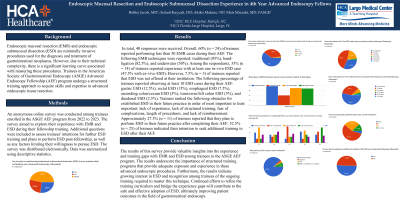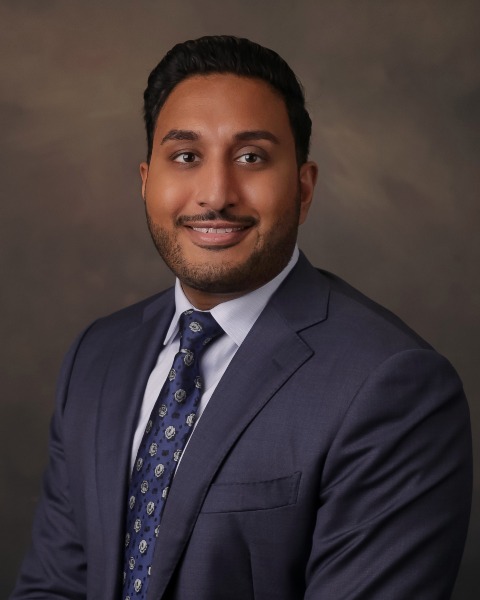Sunday Poster Session
Category: Interventional Endoscopy
P0857 - Endoscopic Mucosal Resection and Endoscopic Submucosal Dissection Experience in Fourth Year Advanced Endoscopy Fellows
Sunday, October 22, 2023
3:30 PM - 7:00 PM PT
Location: Exhibit Hall

Has Audio

Bobby Jacob, MD
HCA Florida Largo Hospital
Largo, FL
Presenting Author(s)
Bobby Jacob, MD1, Suhail Kayyali, DO2, Vikas S. Sethi, DO3, Deep Patel, DO1, Akiko Makino, NP1, Meir Mizrahi, MD2
1HCA Florida Largo Hospital, Largo, FL; 2Largo Medical Center, Largo, FL; 3Largo Medical Center, Clearwater, FL
Introduction: EMR and ESD are minimally invasive procedures used for the diagnosis and treatment of gastrointestinal neoplasms. Trainees in the American Society of Gastrointestinal Endoscopy (ASGE) Advanced Endoscopy Fellowship (AEF) program undergo a structured training approach to acquire skills and expertise in advanced endoscopic tissue resection. This survey gathers information on trainees' experience with EMR and ESD during their AEF.
Methods: An anonymous online survey was conducted among trainees enrolled in the AEF program from 2022 to 2023. The survey aimed to explore their experience with EMR and ESD during their fellowship training and assess intentions plans to perform ESD post-fellowship. Data was summarized using descriptive statistics.
Results: In total, 40 responses were received. Overall, 60% of trainees reported performing < 50 EMR cases during their AEF. The following EMR techniques were reported: traditional (95%), band-ligation (82.5%), and underwater (50%). Among the respondents, 47.5% reported having experience with > 1 ex-vivo ESD case, whereas only 35% reported having experience with > 1 in-vivo ESD case. However, 7.5% of trainees reported that ESD was not offered at their institution. The percentage of trainees who reported observing > 10 ESD cases in various locations of the gastrointestinal tract were as follows: rectal ESD (15%), gastric ESD (12.5%), esophageal ESD (7.5%), ascending colon/cecum ESD (5%), transverse/left colon ESD (5%), and duodenal ESD (2.5%). Trainees ranked the following obstacles for established ESD in their future practice in order of most to least important: lack of experience, lack of structured training, fear of complications, length of procedures, and lack of reimbursement. Overall, 27.5% of trainees reported that they plan to perform ESD in their future practice, whereas 52.5% indicated their intention to seek additional training in ESD after their AEF.
Discussion: The results of this survey provide valuable insights into the experience and training gaps with EMR and ESD among trainees. The results underscore the importance of structured training programs that provide adequate exposure and experience in these procedures. Furthermore, the results indicate growing interest in ESD and recognition among trainees of the ongoing training required to master this technique. Continued efforts to refine the training curriculum and bridge the experience gaps will contribute to the safe and effective adoption of ESD.
Disclosures:
Bobby Jacob, MD1, Suhail Kayyali, DO2, Vikas S. Sethi, DO3, Deep Patel, DO1, Akiko Makino, NP1, Meir Mizrahi, MD2. P0857 - Endoscopic Mucosal Resection and Endoscopic Submucosal Dissection Experience in Fourth Year Advanced Endoscopy Fellows, ACG 2023 Annual Scientific Meeting Abstracts. Vancouver, BC, Canada: American College of Gastroenterology.
1HCA Florida Largo Hospital, Largo, FL; 2Largo Medical Center, Largo, FL; 3Largo Medical Center, Clearwater, FL
Introduction: EMR and ESD are minimally invasive procedures used for the diagnosis and treatment of gastrointestinal neoplasms. Trainees in the American Society of Gastrointestinal Endoscopy (ASGE) Advanced Endoscopy Fellowship (AEF) program undergo a structured training approach to acquire skills and expertise in advanced endoscopic tissue resection. This survey gathers information on trainees' experience with EMR and ESD during their AEF.
Methods: An anonymous online survey was conducted among trainees enrolled in the AEF program from 2022 to 2023. The survey aimed to explore their experience with EMR and ESD during their fellowship training and assess intentions plans to perform ESD post-fellowship. Data was summarized using descriptive statistics.
Results: In total, 40 responses were received. Overall, 60% of trainees reported performing < 50 EMR cases during their AEF. The following EMR techniques were reported: traditional (95%), band-ligation (82.5%), and underwater (50%). Among the respondents, 47.5% reported having experience with > 1 ex-vivo ESD case, whereas only 35% reported having experience with > 1 in-vivo ESD case. However, 7.5% of trainees reported that ESD was not offered at their institution. The percentage of trainees who reported observing > 10 ESD cases in various locations of the gastrointestinal tract were as follows: rectal ESD (15%), gastric ESD (12.5%), esophageal ESD (7.5%), ascending colon/cecum ESD (5%), transverse/left colon ESD (5%), and duodenal ESD (2.5%). Trainees ranked the following obstacles for established ESD in their future practice in order of most to least important: lack of experience, lack of structured training, fear of complications, length of procedures, and lack of reimbursement. Overall, 27.5% of trainees reported that they plan to perform ESD in their future practice, whereas 52.5% indicated their intention to seek additional training in ESD after their AEF.
Discussion: The results of this survey provide valuable insights into the experience and training gaps with EMR and ESD among trainees. The results underscore the importance of structured training programs that provide adequate exposure and experience in these procedures. Furthermore, the results indicate growing interest in ESD and recognition among trainees of the ongoing training required to master this technique. Continued efforts to refine the training curriculum and bridge the experience gaps will contribute to the safe and effective adoption of ESD.
Disclosures:
Bobby Jacob indicated no relevant financial relationships.
Suhail Kayyali indicated no relevant financial relationships.
Vikas Sethi indicated no relevant financial relationships.
Deep Patel indicated no relevant financial relationships.
Akiko Makino indicated no relevant financial relationships.
Meir Mizrahi: Boston Scientific – Consultant. COOK medical – Consultant. Fujifilm – Consultant. Medtronic – Consultant.
Bobby Jacob, MD1, Suhail Kayyali, DO2, Vikas S. Sethi, DO3, Deep Patel, DO1, Akiko Makino, NP1, Meir Mizrahi, MD2. P0857 - Endoscopic Mucosal Resection and Endoscopic Submucosal Dissection Experience in Fourth Year Advanced Endoscopy Fellows, ACG 2023 Annual Scientific Meeting Abstracts. Vancouver, BC, Canada: American College of Gastroenterology.
